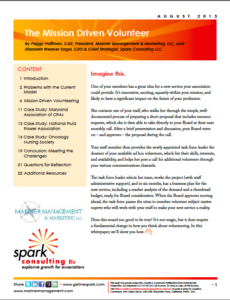 I just finished reading the new white paper that Elizabeth Engel and Peggy Hoffman have put out about “mission-driven volunteers,” and it’s fabulous. The paper makes a compelling case why the current model for volunteering in most associations is broken, and then provides some cool ideas (with good case studies) for how to do it differently–and more effectively. Here’s the direct link to the PDF.
I just finished reading the new white paper that Elizabeth Engel and Peggy Hoffman have put out about “mission-driven volunteers,” and it’s fabulous. The paper makes a compelling case why the current model for volunteering in most associations is broken, and then provides some cool ideas (with good case studies) for how to do it differently–and more effectively. Here’s the direct link to the PDF.
Beyond the practical benefits for association leaders who manage volunteers, though, I think the paper touches on a more broadly applicable concept: the importance of decentralization. Maddie and I write about decentralization in Humanize. Of the 12 human aspects on our “trellis,” decentralization happens to come first. If you want a human organization, then you need to embrace decentralization more than we do in traditional organizations.
But that is much easier said than done. Centralization and consolidation of power at the top of the pyramid is very deeply embedded in the way we run organizations. So much so, that if we see the need to tap into the power of a decentralized system, we will go to great lengths to force-fit our solutions into our centralized system. Not surprisingly, being “centrally decentralized” doesn’t often work out very well, and association volunteer structures are a great example.
Associations basically have a very large and distributed workforce at their disposal in the form of members who would like to volunteer. Sounds good, right? There is definitely potential there. So how do we take advantage of that? Committees and subcommittees. Ugh. We create a structure that mirrors the hierarchical organizational chart, through which the central authorities (the Board) can delegate tasks and actions to the subordinate groups.
Do you see the problem? Trying to access the power of a decentralized, distributed network by imposing a way to control them. Not a good plan. I mean, it works, to some extent, and has for centuries, but it doesn’t actually tap into that decentralized power, the way we know it can.
What we need are better decisions, more innovation, problems being solved quickly. Hoffman and Engel provide some great suggestions on how to do that with volunteers, but it requires you to be okay with some different expectations around control. And I think their lessons are useful in a variety of contexts, beyond just volunteering.

Thanks for the great review Jamie! I also think the white paper ties into another concept you and Maddie talk about a lot: clarity over control. One of the exciting and scary things about a decentralized model if volunteering is that associations have to give up some control in order to enjoy the benefits of adhocracy. Which, as you point out (as does the white paper), requires clarity around mission – and the ability to communicate that mission compellingly.